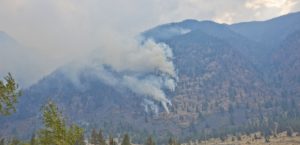
It’s been more than a year since the BC Financial Services Authority (BCFSA) introduced the optional wildfire clause for real estate transactions. With wildfire season upon us, now is the perfect time to refresh your understanding of how this clause helps manage risk in transactions.
How it works
The wildfire clause allows for a single extension of up to 30 days for completion, adjustment, and possession dates in a Contract of Purchase and Sale (CPS) if the buyer is unable to secure fire insurance due to an active wildfire. If the buyer secures insurance before the extension period ends, they must notify the seller, who may then accelerate closing.
Please note:
- The clause does not automatically release the buyer from their contractual obligations — notably, they must prove they made reasonable efforts to obtain insurance.
- The clause applies only to wildfires and excludes all other natural disasters (g. floods).
While buyers and sellers can modify the extension period, legal advice is recommended if extending beyond 30 days.
Finer details for brokers
The wildfire clause is an important legal safeguard for buyers to protect them from breach of contract. However, while the clause itself doesn’t directly affect rate approvals, it can delay mortgage funding, which can trigger serious consequences for borrowers.
Additionally, buyers must understand that this clause doesn’t shield them from certain financing complications. Specifically:
- Many lenders require insurance before funding:
If a buyer can’t secure insurance due to a nearby wildfire, the lender typically won’t release funds, even if the mortgage rate is already approved. - Delays may cause buyers to lose their rate hold:
Many lenders will honour a rate hold for only 90 to 120 days. If closing is pushed beyond that window, the borrower may lose their rate and face higher interest costs or larger borrowing amounts, which could impact qualification for financing. - Reapproval might be necessary:
If closing is delayed significantly, lenders may require new documentation or reassess the borrower’s financial profile. - Higher-risk properties may face financing challenges:
Properties near wildfire zones may limit lender options or trigger additional requirements, such as larger down payments or insurance clauses.
Best practices for brokers
To support clients in wildfire-prone areas, brokers should:
- Encourage early insurance coverage:
Advise buyers to secure fire insurance as soon as possible. - Maintain documentation:
Buyers should track communication with insurance brokers to demonstrate their attempts at securing coverage. - Highlight financial risks:
Discuss potential delays, financing impacts, and related transaction risks. - Advise clients to seek legal guidance:
The clause may affect additional property purchases and financing terms. As such, legal review is recommended.
Natural disaster relief options for borrowers
Beyond wildfire-related challenges, mortgage default insurers have reaffirmed financial relief options for borrowers impacted by natural disasters. Indeed, Canada Mortgage and Housing Corporation (CMHC), Sagen, and Canada Guaranty all offer payment deferrals of up to six months for affected homeowners. (For more, see “Natural Disaster Solutions Reaffirmed by All Three Default Insurers” by Robert McLister, published June 5, 2025, on MortgageLogic.News.)
These solutions provide breathing room for those facing temporary financial hardship due to events such as floods, wildfires, and other extreme weather conditions. While relief measures vary, borrowers should reach out to their lenders for guidance on available support.
This article was written for CMBA-BC on June 5, 2025.
